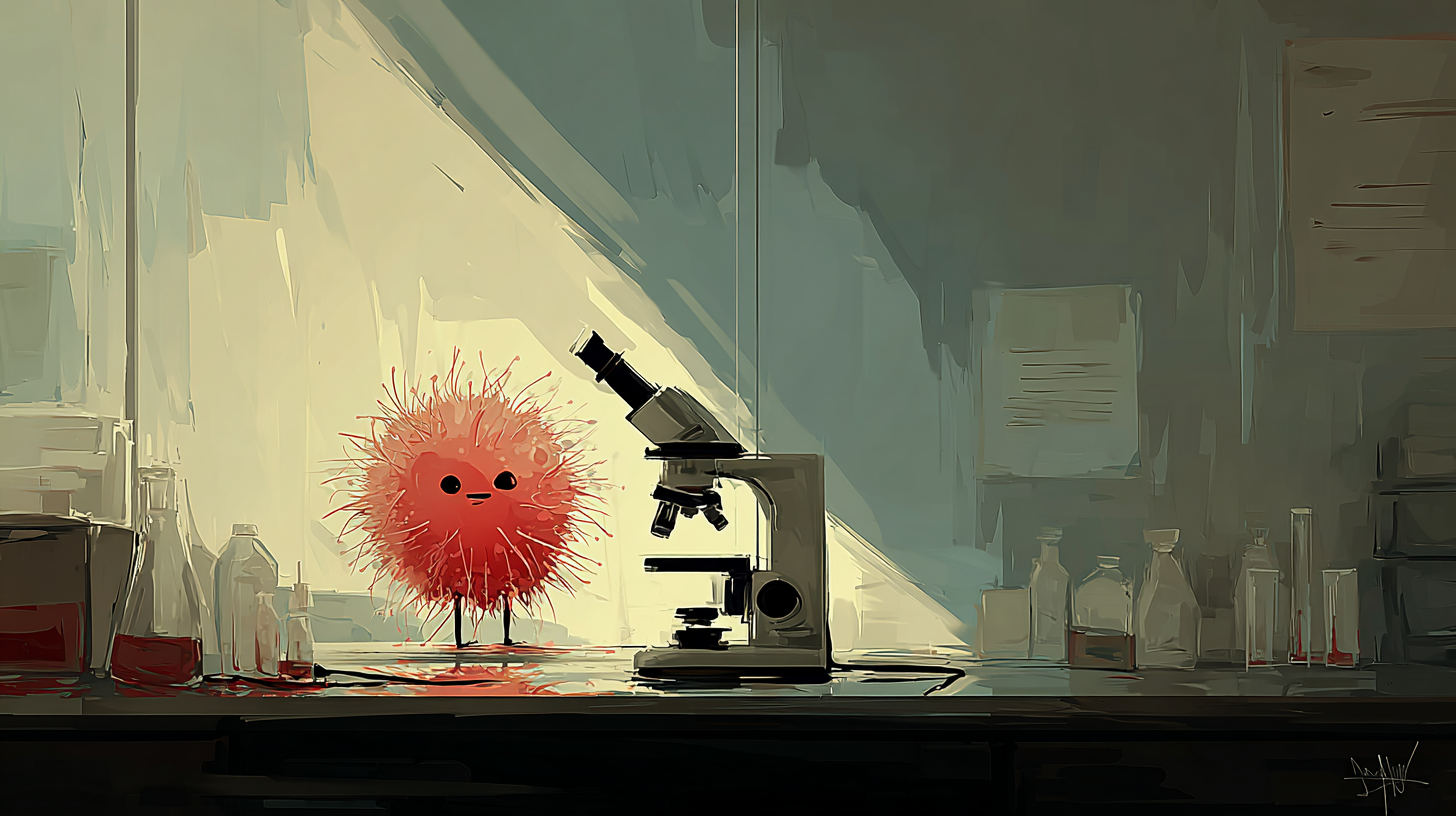Microbe means a very small living thing that you cannot see without a microscope.
microbeは、目では見えないとても小さな生き物のこと(たとえば細菌やウイルス)。
以下は英単語 “microbe” に関するストーリー型学習コンテンツです。まずは大枠の意味を理解して最後の文章で確認しましょう。
「microbe」の主な意味(main meaning)
| 品詞 | 定義(簡潔) | 発音記号(IPA) | 英語例文 |
|---|---|---|---|
| 名詞 | 肉眼では見えない微生物(細菌・ウイルスなど) | /ˈmaɪ.kroʊb/ | The scientist studied the microbe under a microscope. |
「microbe」の語源(etymology)
microbeは、ギリシャ語の「mikros(小さい)」と「bios(生命)」が語源。
つまり、「とても小さな命」という意味から来ています。
この単語の核となるイメージは「目に見えない小さな生物」。
「microbe」の類義語(synonyms)
| 類義語 | 例文 |
|---|---|
| bacterium | This bacterium causes food poisoning. |
| germ | Wash your hands to get rid of germs. |
| virus | The flu is caused by a virus. |
| pathogen | The doctor identified the pathogen quickly. |
| microorganism | Microorganisms live in water, soil, and air. |
「microbe」の反義語(antonyms)
| 反義語 | 例文 |
|---|---|
| macroorganism | A dog is a macroorganism that you can see easily. |
| visible organism | Trees are visible organisms found in nature. |
「microbe」のコロケーション(collocations)
| コロケーション | 例文 |
|---|---|
| harmful microbe | Some harmful microbes can make you sick. |
| beneficial microbe | Yogurt contains beneficial microbes. |
| kill microbes | This soap can kill microbes on your hands. |
| detect microbes | Scientists use tests to detect microbes. |
| spread of microbes | Poor hygiene can lead to the spread of microbes. |
「microbe」の2項表現(binomials)
| 表現 | 例文 |
|---|---|
| germs and microbes | You should wash your hands to remove germs and microbes. |
| bacteria and viruses | The lab studies bacteria and viruses every day. |
英語ストーリー(english story)
Title: The Mystery of the Office Illness
Last week, many employees in the office started to feel sick. Some had fevers, others had stomachaches. Ms. Taylor, the office manager, was very worried.
She called Dr. Smith, a local health inspector. After examining the office, Dr. Smith took samples from the kitchen, doorknobs, and keyboards. “There could be harmful microbes here,” he said.
A few days later, the results came back. The lab found several dangerous bacteria and viruses on common surfaces. “The spread of microbes can happen quickly in shared spaces,” Dr. Smith explained. “But don’t worry, we can kill the microbes with proper cleaning.”
The company hired a cleaning team, and all employees were told to wash their hands often. They also learned that not all microbes are harmful. In fact, yogurt contains beneficial microbes that help your stomach.
Ms. Taylor created a new policy: “Clean your desk every day and avoid sharing cups. This will help us control germs and microbes.”
Since then, nobody has gotten sick. The office is now a cleaner and healthier place to work.
和訳
タイトル:オフィスの病気の謎
先週、オフィスの多くの社員が体調を崩し始めました。熱が出た人もいれば、腹痛を訴える人もいました。オフィスマネージャーのテイラーさんはとても心配しました。
彼女は地域の衛生検査官であるスミス博士を呼びました。オフィスを調べた後、博士はキッチン、ドアノブ、キーボードからサンプルを採取しました。「ここには**有害な微生物(harmful microbes)**がいるかもしれません」と彼は言いました。
数日後、結果が届きました。実験室は一般的な場所でいくつかの危険な**細菌(bacteria)やウイルス(viruses)**を発見しました。「**微生物の拡散(spread of microbes)は共有スペースで急速に起こります」と博士は説明しました。「でも心配いりません。きちんと掃除すれば微生物を殺す(kill the microbes)**ことができます。」
会社は掃除チームを雇い、全社員に手をよく洗うように指示しました。また、すべての**微生物(microbes)が悪いわけではないことも学びました。実際、ヨーグルトにはお腹によい有益な微生物(beneficial microbes)**が含まれています。
テイラーさんは新しいルールを作りました。「毎日自分の机を掃除し、コップを共有しないでください。これで**バイ菌や微生物(germs and microbes)**のコントロールができます。」
その後、誰も病気にならなくなりました。今ではオフィスはより清潔で健康的な職場になっています。
「microbe」のQ&A
- Qmicrobeとbacteriumの違いは何ですか?
- A
bacterium(バクテリア)はmicrobe(微生物)の一種で、細菌のことです。microbeは、細菌だけでなくウイルスやカビなどの目に見えない生物すべてを含む広い言葉です。
- Qgermとmicrobeの違いは何ですか?
- A
germは一般的に病気を引き起こす「バイ菌」を意味しますが、microbeは有害・有益を問わず「微生物」全般を指します。つまり、germはmicrobeの中でも悪いものを指すことが多いです。
- Qmicrobeとvirusの違いは何ですか?
- A
virus(ウイルス)はmicrobeの一種で、自分では生きられず他の生物に入って増える特徴があります。microbeは、virusを含めたすべての小さな生物(細菌やカビなど)を指します。
- Qmacroorganismはmicrobeとどう違いますか?
- A
macroorganism(大型生物)は目で見える大きな生き物のことで、人や犬、木などが含まれます。一方、microbeは目に見えないとても小さな生き物です。
- Q“harmful microbe”とはどういう意味ですか?
- A
「harmful microbe(有害な微生物)」は、人間や動物に病気を引き起こす可能性のある悪い微生物のことを指します。
- Q“beneficial microbe”とはどういう意味ですか?
- A
「beneficial microbe(有益な微生物)」は、健康や自然にとって役に立つ良い微生物のことです。例:ヨーグルトに含まれる乳酸菌など。
- Q“kill microbes”はどういう意味ですか?
- A
「kill microbes(微生物を殺す)」は、石けんや消毒などで、病気の原因になる微生物を死滅させることを意味します。
- Q“spread of microbes”とはどんな場面で使いますか?
- A
「spread of microbes(微生物の拡散)」は、手や空気、物を通して微生物が広がることを言います。学校やオフィスでの感染対策の話などでよく使われます。
- Q“germs and microbes”はどちらも似た意味では?
- A
はい、どちらも小さな生き物を指しますが、germsは特に悪い微生物(病気の元)を指し、microbesは良いものも悪いものも含めた全体を指します。
- Q“bacteria and viruses”の使い方を教えてください。
- A
「bacteria and viruses(細菌とウイルス)」は、よくセットで使われる表現で、どちらも病気の原因になる微生物を指します。例:医療や掃除の話で使われます。
| 単語 | 日本語の意味 | 使われ方(ニュアンス) | 例文 |
|---|---|---|---|
| microbe | 微生物 | 小さな生き物の総称。目に見えないほど小さく、良い働きをするものも悪いものも含む。 | Yogurt is made with healthy microbes.(ヨーグルトは体に良い微生物で作られています。) |
| bacterium(複数形:bacteria) | 細菌 | 微生物の一種。善玉菌・悪玉菌どちらもある。生きていて、自分で増えることができる。 | Some bacteria help us digest food.(ある細菌は私たちの消化を助けます。) |
| germ | バイ菌/病原菌 | 病気を起こす「悪い菌」のこと。日常会話でよく使うカジュアルな言葉。 | Wash your hands to kill germs.(手を洗ってバイ菌をやっつけよう。) |
| virus | ウイルス | 細菌よりももっと小さく、自分では増えられない。生き物の細胞の中に入って増える。 | The flu virus spreads quickly in winter.(インフルエンザウイルスは冬にすぐ広がります。) |



コメント